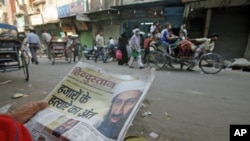India says the bold U.S. strike that killed Osama bin Laden is not something they plan to imitate anytime soon.
Indian government sources say they have no intention of carrying out their own surgical strikes anytime soon against terrorists being sheltered in Pakistan.
Instead, officials say they must continue to "engage" Pakistan in a relationship that is every bit as complex and contentious as the one between Pakistan and the United States.
In a conversation with journalists Wednesday, officials said a "reasoned, sober" approach to dialogue with Islamabad will be a hallmark of Indian foreign policy going forward.
Maroof Raza, an analyst at Security Watch India in New Delhi, agreed the Indian government is obliged, on one level, to show restraint.
"One of the reasons why America could take on this operation so successfully in Pakistan, and do something as bold and dramatic as this, is because Pakistan was not next door to America," he said. "America, therefore, did not have a nuclear-armed neighbor who could react spontaneously, at least with tactical, if not nuclear, weapons if it felt its sovereignty was threatened."
On the other hand, said Raza, India should not passively tolerate decades of Pakistan-backed terror attacks on its citizens. He said the bin Laden killing is a lesson to India that it should develop its covert and special forces capabilities.
"Carry out more ground-based infiltration.. a hit at a target, or even infiltrate assassins within Pakistan who assassinate those who... clearly have been behind bombings in India, and who continue to be sheltered inside huge villas," he said.
Raza said India should imitate Israel, which uses covert tactics to punish terrorists and their supporters.
"Do something like that, convey the message, and then, just keep quiet," he said. "Just ignore. And you can cover your tracks quite easily, but then the message goes out to their patrons and others, that 'excuse me, but India does mean some business.'"
Ajai Sahni, executive director of the Institute for Conflict Management, agrees India needs to get more creative in imposing costs on Pakistan for sheltering terrorists.
"I am not talking about assassination," said Sahni. "I am not talking about counter-terrorist strikes. But I am talking about things that would make the people that are making these decisions to feel a very severe pinch."
The problem, said Sahni, is that Indian officials seem only to have two gears on dealing with Pakistan.
"There is an infinity of alternatives - economic and diplomatic, and other kinds of coercive pressure that can be exerted against Pakistan - but the Indian policy spectrum is exhausted by talking, and not talking. That's it."
Raza and Sahni both point out that the operation that killed Osama bin Laden was the culmination of efforts by two U.S. presidents from opposite ends of the ideological spectrum. In contrast, they say India counterproductively tears down and reinvents its strategic outlook every time there is a change in government.
India Rules Out 'Geronimo'-Style Strikes, Will 'Engage' Pakistan
- By Kurt Achin




